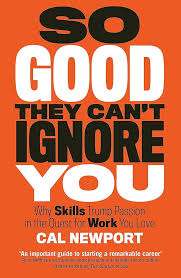I have read twice this book from 1,2 Cal Newport, a book that I’ve specially enjoyed:

Although the title already gave clues as to where things were going, there are serveral conclusions that I didn’t see coming so clearly, but once I processed the information, they make perfect sense. Al least for me, the thesis that Cal defends is convincing.
# Follow your passion?
The book analyzes the well-known slogan “Follow your passion”. Two ideas that question it:
- Pursuing one’s passion is more complicated than it seems.
- There are no compelling reasons to support that following your passion works:
- first, because most people don’t have many passions;
- second, because making that a professional career and an interest that we have (= passion?) go hand in hand does not guarantee a successful career, nor that we will feel fulfilled with it.
# The four rules
Cal sets out four rules, which I quote below:
- Do not pursue your passion.
- Do it so well that they can’t ignore you.
- Become a craftsman of whatever you want to do.
- Be perfectly clear about what kind of knowledge capital you need and at what level you’re considered good enough in whatever you want to do.
- And, also very important to me, you must be patient.
- An example that comes to mind: with a short course and little practical experience in something, you’re not going to become a superstar in the subject. Keep that in mind.
- Take control of your career.
- Don’t get carried away, for example, by promotions that sound great but end up leading you down paths you didn’t want to take.
- We all know people who, after taking a “career leap,” such as moving from technical work to solely managerial tasks, ended up frustrated and dissatisfied with their lives, precisely because they stopped doing what truly motivated them.
- Don’t get carried away, for example, by promotions that sound great but end up leading you down paths you didn’t want to take.
- Think small but act big.
- Also known as the importance of the mission.
Other ideas emphasized by the author:
- The specific details of what we do are less important than we might initially think.
- It’s key to be really good at something and develop rare and highly sought-after skills.
- Newport introduces the concept of career capital:
- He tells the story of a person who had significant career capital in marketing but decided to make a radical shift into the world of yoga, without fully considering what he was losing from his career capital and what he was missing in this new profession. These decisions caused his expectations to be unmet and led him to suffer financial hardship.
# The case of Steve Jobs
The best-known case he describes is that of Steve Jobs, co-founder of Apple, about whom he suggests we should “do what he did, not what he said,” referring to a well-known talk he gave. En sus comienzos en la universidad, Jobs no tenía muy claro a qué dedicarse. However, as soon as a business opportunity presented itself, he threw himself into it and ended up developing a highly successful (and somewhat resounding) career, making him one of the tech gurus of our time.
# The Snowball Effect
Another important idea the book conveys:
- If you work over time to become better at something, it triggers the Snowball Effect: as we gain proficiency at something and improve our skills, our passion for it also grows.
Newport’s book was published in 2012, the same year as his talk to Google employees, a video of which I’ve included below.
By the way, the title is taken from a quote by American actor Steve Martin (video). If you don’t know anything about Steve Martin, we suggest you read the link above and you’ll come across a guy with a very interesting life.
Footnotes
-
English version: Newport, C. (2012). So good they can’t ignore you : why skills trump passion in the quest for work you love. Piatkus. ↩
-
Spanish version: Newport, C. (2017). Hazlo tan bien que no puedan ignorarte: por qué ser competente importa más que la pasión para alcanzar el trabajo de tus sueños (D. Pereda Sancho, Trans.). Asertos. ↩
